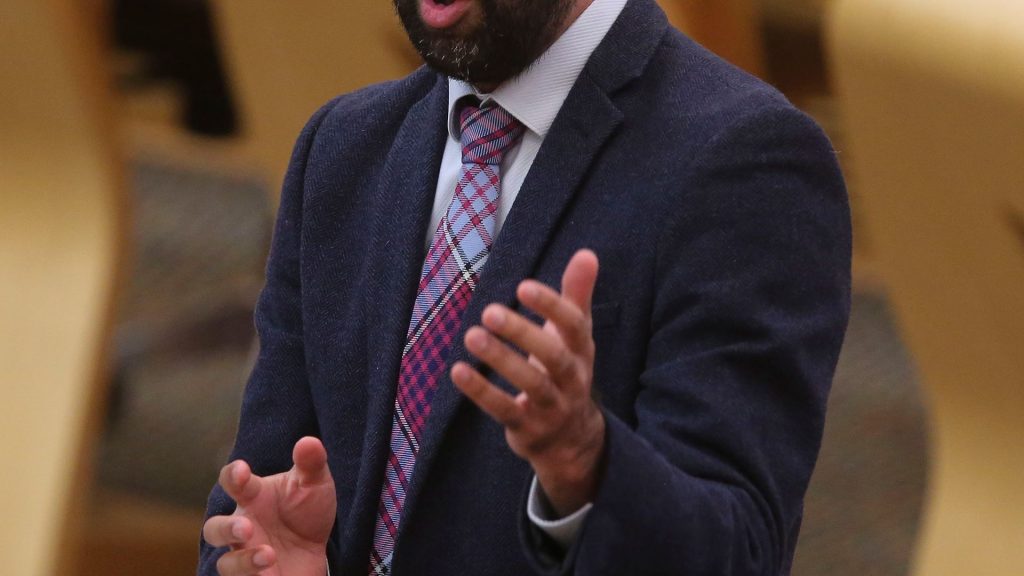
The SNP’s immensely controversial hate crime legislation is highlighting divisions within the Scottish government, says MAURICE SMITH.
Pity Humza Yousaf. The Scottish justice minister probably thought his latest legislation would go down well with voters in self-styled ‘progressive’ Scotland, outlawing purveyors of racial and religious hatred.
Instead, the minister finds himself at the centre of a free speech debate during which he seems to have offended those at either ends of the modern political agenda. Condemning hate speech on Twitter may go down well, but trying to introduce legislation to make it illegal is quite another matter.
The Scottish government’s supposedly “woke agenda” has been seized upon by dissidents within the independence campaign, some of whom see the Sturgeon administration’s political correctness as a distraction from the job of breaking Scotland free from the United Kingdom.
Yousaf inadvertently conjured up an Orwellian image of a future Scotland for his critics, when he indicated that in future someone could be prosecuted for ‘hate crime’ uttered within their own home. He resisted calls to introduce a ‘dwelling defence’ similar to that in existing legislation. He argued – on Twitter, of course – “If you invite 10 mates round & it can be proven beyond reasonable doubt that you intentionally stirred up hatred against Jews, why should this not be prosecuted. It would if you did so down the pub but not in your house?”
The Bill is being scrutinised by Holyrood’s justice committee, and Yousaf has conceded that he will have to spell out exactly how to define the outlawing of “stirring up hatred”. Critics say the Bill fails to define what “stirring up” might mean.
Opponents evoke an image of a Stasi-like Scotland, already something of a one-party state, given the overwhelming strength of the SNP, which is completing three terms in office and heading for a fourth after elections next May.
“The Scottish government’s wokey horror picture show is set for an extended run,” remarked the Herald commentator Kevin McKenna recently. An independence supporter, he is an outspoken critic of the SNP leadership’s social and cultural agenda.
The Bill’s critics include the Catholic Church in Scotland, human rights groups, free speech campaigners and even police officers concerned about the burden of investigating supposed offences.
The SNP might have learned from a humiliating experience concerning its earlier attempt to rein in sectarianism. Cobbled together after a controversial Celtic v Rangers cup tie in 2010, the Scottish Government introduced the Offensive Behaviour at Football and Threatening Communications Act, under which the police could charge supporters with ‘offensive’ shouts or chants – usually to do with Catholic and Protestant football rivalry.
The act introduced the idea that a crime – say breach of the peace or assault – might be aggravated by sectarian overtones, a factor that made judges and juries very wary and reluctant to convict the accused.
It is one thing to find somebody guilty of assault, especially if the incident occurs on live television (as happened once at Edinburgh’s Tynecastle stadium). But it is quite another to agree whether or not the perpetrator called his victim a “fenian bastard” during that incident, or whether it was prejudice of the victim’s religion that prompted the assault.
After several years of criticism, and failed prosecutions, the SNP finally conceded to opposition pressure and abandoned the Act. As one lawyer said at the time: “It was bad law. It may have been well intentioned, but bad law gets exposed in court. How do you define ‘offensive behaviour’? Are you offended by the same things that offend me?”
That humiliation was followed by another controversial bill, this time intended to protect children. The Named Persons Bill was eventually dumped after the UK Supreme Court ruled that some of its provisions breached human rights laws.
Few will admit they enjoy ‘hate speech’ or wish to support ‘hate crimes’. In the media, or on Twitter, most of us will happily condemn the very idea. But writing down a description of hate speech, and then making it illegal, is quite another matter.
Yousaf has refused to introduce any further amendments. Nor is he inclined to make exemptions, for example in the fields of journalism or theatre. He told MSPs that this would prevent hate activists to hide behind the cloak of dramatic licence or freedom of expression. “We wouldn’t want to give the likes of Tommy Robinson a defence by saying that he’s ‘a blogger who writes for The Patriot Times so my reasonable defence is that I am a journalist’,” insisted Yousaf.
But what if Tommy Robinson – or anybody else – did attempt that course of action? If they are in fact indulging in racial hatred or hateful language, surely existing laws might be invoked? Can readers or theatre goers not be trusted to draw their own conclusions if a blogger, or a working journalist or theatre director for that matter, uses the medium to promote hatred?
Critics say the Bill betrays an authoritarian streak within the SNP that is intolerant, and inflexible. Kevin McKenna’s critique says as much: “Mr Yousaf himself has now come to be regarded as one who typifies the entire government he represents: an over-promoted party shill, incapable of independent thought and with the distinctive attributes of a bully,” wrote McKenna. “Rather than retreat from some of his proposed bill’s more ghastly proposals, like a thwarted adolescent he reinforced them, ditching all reason and sense of proportion.”

But Yousaf insists that “confronting hate crime is central to building the safer, stronger and inclusive Scotland that we all want to see – free from hatred, prejudice, discrimination and bigotry. Our plans to legislate will ensure hate crime law is fit for the 21st century, giving sufficient protection to those who need it”.
Another issue has been picked up by the bill’s opponents; that of the writer J.K. Rowling, who has been castigated and pursued on social media because of her views on transgenderism. Rowling has written critically about aspects of trans activism, and has been the target of abuse as a result.
Critics say somebody with similar views to Rowling might find themselves subject to investigation for alleged hate speech.
Yousaf insists that such offences can be committed in the privacy of the home. “Are we comfortable giving a defence to somebody whose behaviour is threatening or abusive which is intentionally stirring up hatred against, for example, Muslims?” he asked committee members. “Are we saying that that is justified because that is in the home?”
Scottish playwright David Greig told the committee that “a solution was being looked for a problem that doesn’t exist”, as he urged MSPs to strike out a section highlighting plays and public performances. He did not want to see groups using the law to get plays banned.
Scottish PEN, the free speech organisation, called for a clause which took into account “literary, artistic, journalistic, columnist and scholarly character of communication” so that writers could be assured that they are not targets of the Bill.
Scottish Newspaper Society director John McLellan commented: “It would be a brave person who would risk going to jail for seven years for something they had written, but the problem here is they wouldn’t necessarily know they had committed an offence when they wrote the piece and when it was published, It may be their view that it’s balanced, but if someone takes offence and believes it’s in breach of the law and raises a complaint, the police would have to investigate.”
Jamie Gillies of the Free to Disagree Campaign said there were “seismic issues” in which needed to be resolved. “There’s still too low a threshold for offending, the wording is hopelessly vague, free speech provisions are inadequate, there is no ‘dwelling defence’, and people outside Scotland could be caught,” he added.
“Crucially, the government and other proponents have not demonstrated how these specific proposals would reduce hate-related crimes, or lend greater protection to citizens. Existing laws already catch violence, harassment and abuse.”
The SNP’s perseverance mystifies some supporters and even a few of its elected representatives. Long-serving MSP Alex Neil said it is poorly worded and unnecessary. The Bill seems to fall along the fault line within the party on either side of which lie the various public tensions such as the timing of a renewed independence campaign, and even the Scottish government’s earlier vain pursuit of complaints against former first minister Alex Salmond.
Last year around 5,600 hate crimes were reported to the Crown Office and Procurator Fiscal Service in Scotland, approximately one per 1,000 people. The most common concerned race, followed by sexual orientation. Each crime was investigated within the realm of the existing range of laws. Critics say Yousaf’s new bill would not make prosecutors’ task any easier, and would only introduce greater complexity to an already difficult area of the law.









